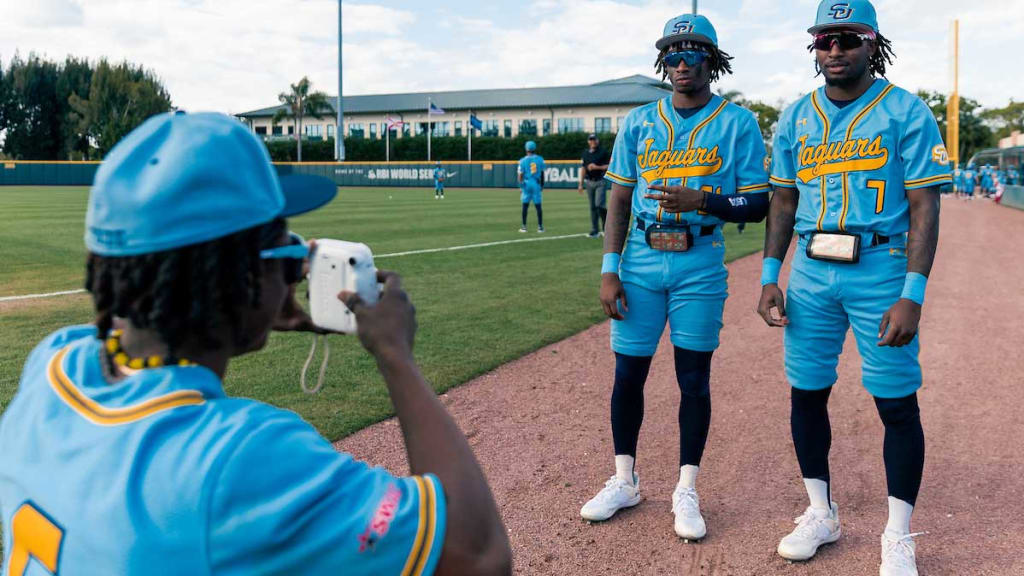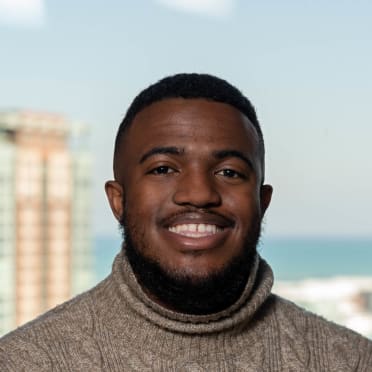VERO BEACH, Fla. -- If you stick around long enough, it begins to feel like the universe is playing tricks on you -- especially as a baseball fan. History tends to repeat itself between the lines, giving you random bouts of d¨¦j¨¤ vu, ensuring that the beautiful legacies of the sport live on in curious ways.
And in watching Southern University play against Alabama State on Friday evening at the Andre Dawson Classic, turning your eyes toward the right side of the outfield, it¡¯s hard not to believe that the stars had aligned to re-create a truly special piece of baseball history.
Occupying center and right field for Southern were the Radcliffe brothers, sophomore Jacoby and junior Khyle -- who are the grand-nephews of Negro League legends and brothers Ted ¡°Double Duty¡± and Alex Radcliffe. And for Jacoby and Khyle, the ability to look across that bluegrass and see someone you grew up with, who knows you inside and out, is an impossible feeling to describe.
¡°I¡¯ve been playing since I was 3, so I¡¯ve been [playing with Khyle] for about 15, 16 years,¡± Jacoby said. ¡°Nah, it doesn¡¯t get old. It¡¯s a once in a lifetime, you don¡¯t really see brothers playing on the same collegiate baseball team, even the pros. It¡¯s our dream to make it to the pros and play with each other.¡±
Hailing from the South Side of Chicago, the duo have been nearly inseparable throughout their baseball careers. From travel teams to RBI programs in Chicago, and even their most formative years on the varsity teams at Morgan Park High School, the brothers were coached by their father, Ernest Radcliffe.
Ernest, the nephew of Double Duty and Alex, provided his children with a direct connection to their Negro Leagues lineage at every turn that he could -- because it¡¯s what his father did for him. Ernest¡¯s dad and uncles introduced him to baseball at the age 5, taking him to the parks in the South Shore neighborhood, decked out in catcher¡¯s gear, following the path of his predecessors. And as Ernest grew older, he began to learn about Double Duty¡¯s legendary feats (which earned him the only name he was ever called by anyone), and the full breadth of his family¡¯s history.
¡°All the family would come over and play cards ¡ always cracking jokes and talking about the history of when they played and everything,¡± Ernest said. ¡°I started looking it up and asking my father questions. My uncle told me how he got his name, Double Duty, by pitching one game and then catching for Satchel Paige in the second game. Alex Radcliffe, a third baseman and 13-time All-Star, played with the Chicago American Giants.
¡°Double Duty was in the game for 54 years as a player and as a coach. My dad stopped playing early on and he moved to Chicago, because they were still in Mobile, Ala. ¡ He was very instrumental in bringing the entire Radcliffe [family] to Chicago, that¡¯s where things started blossoming for them.¡±
And blossom they did. Born two years apart, Double Duty (the moniker was given to him by sportswriter Damon Runyon after his famed doubleheader) and Alex (also known as Alec) spent their years carving a nomadic path across America and emblazoning their name into the Negro Leagues lore. After settling into Chicago from Mobile, following Ernest¡¯s father and the swath of Black Southerners during the Great Migration, Alex found a home with the Chicago American Giants, becoming a perennial All-Star with a penchant for clutch moments and power to all fields. Double Duty primarily spent his time playing and coaching for the greatest teams of all time, pitching and catching in doubleheaders for the St. Louis Stars (1930), Homestead Grays (1931) and Pittsburgh Crawfords (1932).
Even while the nature of the Negro Leagues forced them to go their separate ways for years, in search of worthwhile pay and safety in a landscape marked by segregated violence, Double Duty and Alex still managed to find stints on the same team. They were together on the Chicago American Giants in the early 1940s and the Birmingham Black Barons in 1942, spending time at the hallowed Rickwood Field, just 210 miles from their birthplace in Mobile.
¡°I think they should both be in the National Baseball Hall of Fame,¡± said Bob Kendrick, president of the Negro Leagues Baseball Museum in Kansas City. ¡°Alex may have been the better baseball player. He was a tremendous, five-tool guy. But Double Duty did everything across the game, doing it with great flair. He pitched, caught and managed.
¡°They took two different routes, but were equally impactful. I think that¡¯s why the Radcliffe family is such a special family, even though they¡¯ve been a bit unheralded in the upper echelon when we talk about baseball families. But they shouldn¡¯t be.¡±
Instilled with the legacy of his predecessors, Ernest embarked upon a professional career, playing three years in the Cardinals organization. Once he retired, after quitting a teller position, he found his way to coaching T-ball at the South Side YMCA. And once his children started playing sports, his passion for coaching deepened.
Ernest coached all of his children who played in high school, from his son, Kendall, who played in the Texas Rangers organization, to Khyle and Jacoby, the youngest son. Ernest admits he was toughest on his kids, and worked hard to impart countless lessons and hard truths upon them.
¡°We learned that baseball was a failure sport, and we chose to play,¡± Jacoby said. ¡°Even if we go 0-for-3 or 0-for-4 with four strikeouts, there¡¯s always another day, you always get an opportunity. [We learned] to just have integrity, and to be tough, both physically and mentally.¡±
Along with those lessons came stories about Double Duty and Alex as the family kept traditions and memories alive. Alex passed away in 1983, but Double Duty was present at Radcliffe family functions until his passing in 2005, showing up at the eldest Radcliffe children¡¯s biggest baseball moments in their youth.
¡°Knowing that they paved the way for us -- I never got to meet Alex, but I met Duty when I was younger,¡± Khyle said. ¡°Just knowing the legacy that he built around the city of Chicago and the game of baseball, it meant a lot.¡±
There¡¯s a poetic beauty in the way that Khyle and Jacoby mirror the path of Double Duty and Alex, who grew up playing together in Alabama and Chicago, before splitting apart to carve out their own lanes and later reuniting.
After graduating from Morgan Park a few years ahead of Jacoby, Khyle played at Division I St. Louis in 2020, then after COVID hit he played at John A. Logan Community College until '22. Jacoby was in his recruiting process after winning a city championship at Morgan Park in 2021 and becoming an impact player and leader as a senior in '22. Their recruiting timelines synced up -- Khyle was looking to break back into Division I ball and was sought after by Tennessee Tech. Yet, he and Jacoby went on a visit together to Southern University.
Jacoby knew that Southern was the right place for him from the outset, and committed to the HBCU program before he graduated in 2022. Khyle remained steadfast, until something clicked for him.

¡°My wife Tanya and I were at dinner, and Khyle called me,¡± Ernest said. ¡°And was like, ¡®Dad, I¡¯m decommitting from Tennessee Tech. I¡¯m going to go with my brother, to teach him to become a college baseball player and to make sure he¡¯s on the right track.¡¯ And I cried, because he gave up a tremendous opportunity to play with his brother.¡±
¡°Yeah, I remember [the call] exactly,¡± Khyle said, letting a smile slip as the moment rushed from his memory banks again. ¡°I was playing summer ball and I was on a bus. I texted coach [Chris] Crenshaw, told him I wanted to be a Southern Jag. Then I called my dad right after, he started tearing up -- I could tell on the phone. He was just filled with joy.¡±
For Jacoby, there are few words to describe what it meant to him to have his brother deviate from his path to join him.
¡°I was happy when I found out he wanted to come to Southern, it was like he¡¯d been a role model,¡± Jacoby said. ¡°We grew up together, so him being there to show me the ropes of college baseball is a really good experience.¡±
Now the brothers are forging a path together at the program that produced Hall of Famer Lou Brock and Golden Spikes winner Rickie Weeks. There¡¯s an understanding that the Radcliffes are receiving top-notch coaching, which is vital for their dreams of reaching the next level.
But at the center of it all is the comfort that comes with playing baseball with your brother, the person who recognizes your faults and elevates your successes at every turn. It certainly manifests on the field -- when a deep fly ball is blasted off an Alabama State bat, Jacoby ranges back with ease, as Khyle¡¯s voice echoes ¡°you got it¡± off the trees.
¡°We bounce off each other like brothers should,¡± Khyle said. ¡°Whenever he¡¯s going through anything at the plate or in the outfield, we know what to tell each other. Whenever I¡¯m going through something, he knows what to tell me. And whenever we¡¯re doing good, we know what to say to each other to keep us going.¡±
Everyone knows the importance of what Jacoby and Khyle are doing. Ernest, when thinking about the hardships that his father and his uncles faced, the journey his children took, admits that this is something that every ¡°dad has always wanted.¡±
Kendrick, who was in the booth at the Andre Dawson Classic on Friday, beams with pride when thinking about how these young men are carrying on the legacy of their ancestors.
Even the youngest Jacoby appreciates the lineage that precedes them, fully planning on shouldering the responsibility as they move forward.
¡°I can¡¯t name a lot of people who had great uncles who played in the Negro Leagues, and are Negro League Hall of Famers,¡± Jacoby said. ¡°We have the opportunity to do what they did. ¡ God blessed us with the ability to play baseball at the highest level.
¡°Our nephews came to the Cactus Jack [Classic], and they just look up to us. We can tell they want to play baseball, they¡¯re always like, ¡®Can we hit with y¡¯all?¡¯ To have somebody that looks up to us, that's family, that feels good.¡±
At the very core of it all, the Radcliffes are the product and example of unconditional love. It¡¯s what prompted Ernest¡¯s father to beckon his brothers north. It¡¯s what made life a little easier for Double Duty and Alex, as long nights on the road became a tad more tolerable with their brother by their side. Love is what instilled the passion for baseball into Ernest, and what propelled him to teach his sons the game he loves.
It¡¯s what propels Khyle and Jacoby now, what fuels their closeness and willingness to push each other to be great. When Khyle uncorked a solo homer, Jacoby was the first to meet him from the dugout, where they unleashed a mammoth celebration that almost surpassed the feat on the field. In that moment, it¡¯s impossible not to think of Double Duty and Alex getting their own version of that years before, to imagine Ernest smiling at home -- to picture that celebration not as an endpoint, but as another beautiful scene in the endless story of one of Black baseball¡¯s greatest families.

